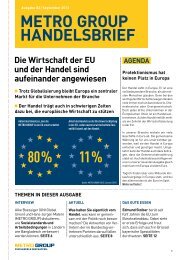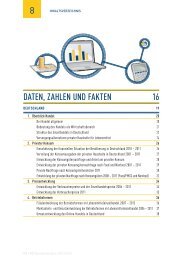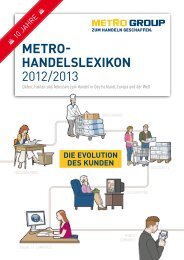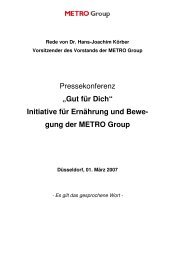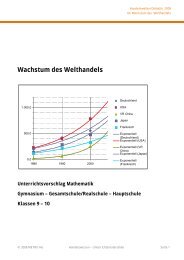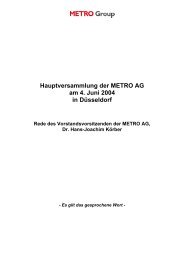pdf (18.3 MB) - METRO Group
pdf (18.3 MB) - METRO Group
pdf (18.3 MB) - METRO Group
You also want an ePaper? Increase the reach of your titles
YUMPU automatically turns print PDFs into web optimized ePapers that Google loves.
<strong>METRO</strong> GROUP : ANNUAL REPORT 2010 : BUSINESS<br />
→ GROUP MANAGEMENT REPORT : 10. ACCOUNTING-RELATEd INTERNAL MONITORING ANd RISK MANAGEMENT SySTEM<br />
The planning tool divides the process of preparing the individual<br />
financial statements into key milestones, which in<br />
turn are divided into individual activities. In terms of content,<br />
these milestones and activities are geared towards<br />
<strong>METRO</strong> GROUP’s IFRS accounting guideline and thus reflect<br />
its implementation. Compliance with additional deadlines<br />
and milestones that are provided centrally by the planning<br />
tool for the purpose of structuring and coordinating the<br />
preparation of the consolidated financial statements is<br />
monitored by <strong>METRO</strong> AG’s Corporate Accounting department.<br />
The scheduling and monitoring of the milestones and<br />
activities required to achieve these <strong>Group</strong> milestones as part<br />
of the preparation of individual financial statements are part<br />
of the responsibilities of the respective company’s management.<br />
Once they have been transmitted from the individual financial<br />
statements under IFRS to the SAP-based consolidation<br />
system, the financial data are subjected to an automated<br />
plausibility review in relation to accounting-specific contexts<br />
and dependencies. Any errors or warning messages generated<br />
by the system during this validation process must be<br />
addressed by the person responsible for the individual<br />
financial statement before the data are transmitted to the<br />
consolidation facility.<br />
The report in which each <strong>Group</strong> company provides a comparison<br />
of key items of the balance sheet and the income<br />
statement with prior-year figures as well as relevant comments<br />
represents another monitoring instrument. Each<br />
<strong>Group</strong> company must provide this report to <strong>METRO</strong> AG in the<br />
context of the preparation of individual financial statements.<br />
Access regulations for accounting-related EdP systems<br />
(SAP-FI) provide for IT security. Each company included in<br />
the consolidated financial statements is subject to the regulations<br />
concerning IT security. These regulations are summarised<br />
in an IT security guideline, with <strong>Group</strong>-wide compliance<br />
being monitored by the Internal Audit department. This<br />
ensures that users only have access to the information and<br />
systems needed to fulfil their specific task.<br />
Accounting processes in the context of<br />
consolidation<br />
The planning tool also divides the process of preparing<br />
the consolidated financial statements into key milestones,<br />
activities and deadlines. In the process, the completion of<br />
→ p. 127<br />
typical consolidation measures – including sales elimination,<br />
expense and income, liability and capital consolidation<br />
– represents specific milestones in the preparation<br />
of the consolidated financial statements. Personnel<br />
responsibilities for the consolidation measures mentioned<br />
above are documented in consideration of stand-in<br />
arrangements.<br />
The <strong>Group</strong> also relies on external service providers to handle<br />
support activities related to the preparation of the consolidated<br />
financial statements. These services essentially<br />
relate to valuations of real estate, pension obligations and<br />
share-based remuneration.<br />
The consolidation measures required to prepare the consolidated<br />
financial statements are subjected to various systematic<br />
and manual controls. The automated plausibility<br />
reviews (validations) used in individual financial statements<br />
data also apply to the consolidation measures. Additional<br />
monitoring mechanisms at <strong>Group</strong> level include target-performance<br />
comparisons as well as analyses dealing with the<br />
composition and changes of individual items in the balance<br />
sheet and the income statement. Compliance with internal<br />
controls covering the preparation and accounting process in<br />
the context of the compilation of the consolidated financial<br />
statements is regularly monitored by the Internal Audit<br />
department.<br />
Access regulations for the consolidation system SAP EC-CS<br />
are implemented to ensure adherence to IT security regulations<br />
(writing and reading authorisations). Authorisations to<br />
use the consolidation system are managed centrally by<br />
<strong>METRO</strong> AG. The approval is given only from the Corporate<br />
Accounting and Planning & Controlling departments. This<br />
ensures that users only have access to data they require to<br />
fulfil their specific tasks.<br />
Independent audit/control<br />
Internal auditing<br />
The Internal Audit department provides independent and<br />
objective audit and consulting services within <strong>METRO</strong> GROUP<br />
and supports the Management Board and <strong>METRO</strong> GROUP<br />
executives in reaching their goals through a potential-orientated<br />
assessment of key management and business processes.<br />
In coordination with the Management Board and the<br />
<strong>Group</strong> companies, the Internal Audit department develops a<br />
risk-orientated annual audit and project plan.



